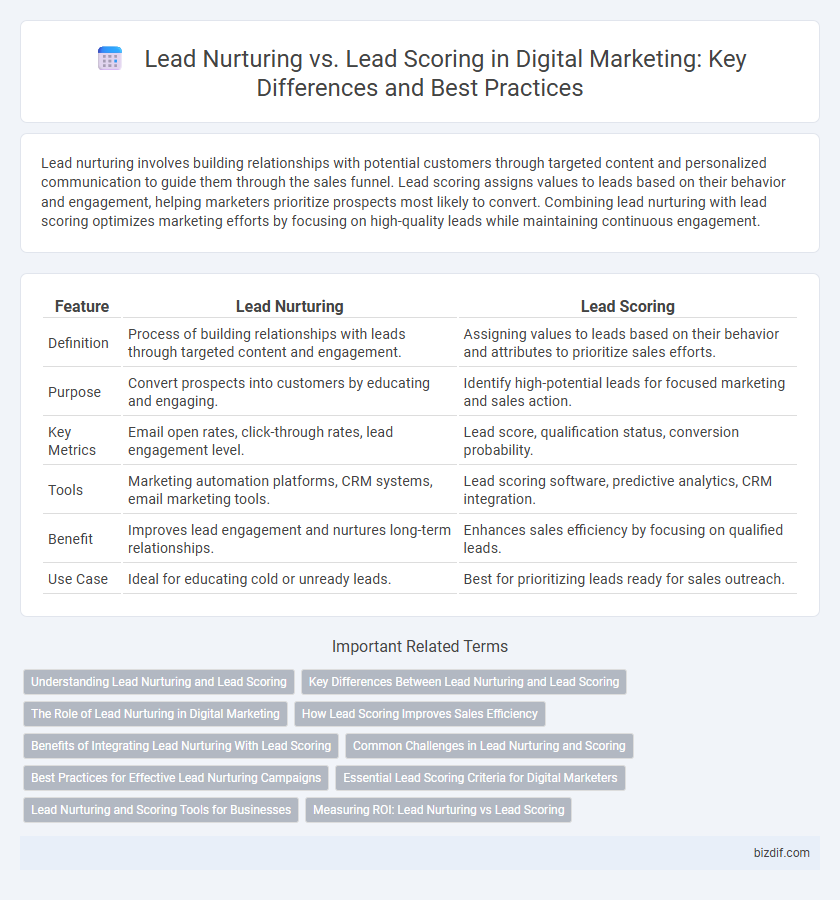Lead nurturing involves building relationships with potential customers through targeted content and personalized communication to guide them through the sales funnel. Lead scoring assigns values to leads based on their behavior and engagement, helping marketers prioritize prospects most likely to convert. Combining lead nurturing with lead scoring optimizes marketing efforts by focusing on high-quality leads while maintaining continuous engagement.
Table of Comparison
| Feature | Lead Nurturing | Lead Scoring |
|---|---|---|
| Definition | Process of building relationships with leads through targeted content and engagement. | Assigning values to leads based on their behavior and attributes to prioritize sales efforts. |
| Purpose | Convert prospects into customers by educating and engaging. | Identify high-potential leads for focused marketing and sales action. |
| Key Metrics | Email open rates, click-through rates, lead engagement level. | Lead score, qualification status, conversion probability. |
| Tools | Marketing automation platforms, CRM systems, email marketing tools. | Lead scoring software, predictive analytics, CRM integration. |
| Benefit | Improves lead engagement and nurtures long-term relationships. | Enhances sales efficiency by focusing on qualified leads. |
| Use Case | Ideal for educating cold or unready leads. | Best for prioritizing leads ready for sales outreach. |
Understanding Lead Nurturing and Lead Scoring
Lead nurturing involves building relationships with potential customers through targeted content and personalized communication to guide them through the sales funnel. Lead scoring assigns numerical values to leads based on their behavior, engagement level, and demographic information to prioritize follow-up efforts. Effective integration of lead nurturing and lead scoring enhances conversion rates by aligning marketing strategies with lead readiness.
Key Differences Between Lead Nurturing and Lead Scoring
Lead nurturing focuses on building relationships with potential customers through personalized content and communication, aiming to guide leads through the sales funnel over time. Lead scoring assigns numerical values to leads based on their engagement and behavior, prioritizing them for sales follow-up. The key difference lies in lead nurturing's emphasis on continuous engagement versus lead scoring's role in qualification and prioritization.
The Role of Lead Nurturing in Digital Marketing
Lead nurturing in digital marketing involves building and maintaining relationships with potential customers through targeted content and personalized communication, effectively guiding leads through the sales funnel. It increases conversion rates by engaging prospects with relevant information at each stage of their buyer's journey, improving trust and brand loyalty. Strategic lead nurturing combined with automated marketing tools enhances customer retention and maximizes the lifetime value of leads.
How Lead Scoring Improves Sales Efficiency
Lead scoring improves sales efficiency by prioritizing leads based on their likelihood to convert, enabling sales teams to focus efforts on high-value prospects. By assigning numerical values to lead behaviors and demographics, companies can streamline the sales process and reduce wasted time on unqualified leads. This targeted approach accelerates the sales cycle and boosts overall revenue generation.
Benefits of Integrating Lead Nurturing With Lead Scoring
Integrating lead nurturing with lead scoring enhances the precision of identifying high-quality leads by continuously engaging prospects and assessing their readiness to buy. This combination streamlines marketing efforts, resulting in improved conversion rates and more efficient allocation of sales resources. Businesses gain deeper customer insights, enabling personalized content delivery that accelerates the sales funnel progression and maximizes ROI.
Common Challenges in Lead Nurturing and Scoring
Common challenges in lead nurturing and scoring include accurately identifying the lead's stage in the buyer's journey and maintaining engagement without overwhelming the prospect. Inconsistent data across marketing and sales platforms often leads to ineffective scoring models and missed follow-up opportunities. Aligning communication strategies with dynamic lead behavior requires constant data analysis and agility in campaign adjustments.
Best Practices for Effective Lead Nurturing Campaigns
Effective lead nurturing campaigns prioritize personalized content tailored to the lead's behavior and stage in the buyer's journey, increasing engagement and conversion rates. Implementing marketing automation tools enables timely and relevant communication, while continuous analysis of lead responses helps refine messaging and improve campaign performance. Segmenting leads based on demographics, interests, and interaction history ensures precise targeting and maximizes the impact of nurturing efforts.
Essential Lead Scoring Criteria for Digital Marketers
Lead scoring in digital marketing relies on essential criteria such as demographic information, behavioral engagement, and past purchasing history to prioritize leads effectively. Digital marketers assign values based on website interactions, email open rates, and content downloads to identify high-potential leads ready for sales follow-up. Incorporating predictive analytics enhances lead scoring accuracy, ensuring marketing efforts focus on prospects with the highest likelihood of conversion.
Lead Nurturing and Scoring Tools for Businesses
Lead nurturing and lead scoring tools are essential for optimizing digital marketing strategies by automating personalized communication and prioritizing high-quality leads. Platforms like HubSpot, Marketo, and Pardot offer advanced lead nurturing capabilities such as targeted email campaigns and behavior tracking, while integrating lead scoring models that assign numerical values based on engagement metrics and demographic data. Businesses leveraging these tools can streamline their sales funnels, improve conversion rates, and focus resources on leads with the highest potential for revenue growth.
Measuring ROI: Lead Nurturing vs Lead Scoring
Measuring ROI in digital marketing requires distinguishing between lead nurturing and lead scoring effectiveness; lead nurturing focuses on building relationships and increasing engagement over time, which drives long-term revenue growth and customer retention. Lead scoring quantifies leads based on behavior and demographics, enabling targeted resource allocation for higher conversion rates and immediate sales impact. Analyzing CRM data and marketing automation reports provides precise ROI insights, optimizing both strategies for maximum profitability.
Lead Nurturing vs Lead Scoring Infographic

 bizdif.com
bizdif.com